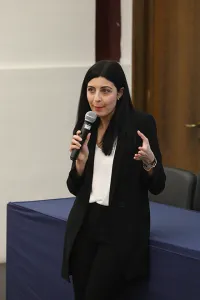
Post-doctoral Research Fellow in Criminal Law and Teaching Assistant at the Department of Law, Luiss Guido Carli University, Rome
Research project title:
Compliance and New Technologies. AI Software as Tools to Prevent Corporate Crimes
Abstract
The use of artificial intelligence (AI) software is an emerging trend in the prevention of crime-risk inside corporations and other complex organizations. AI software are capable to process, analyze and compare infinite amounts of data, to offer results that are simply inaccessible to human activity. The research project intends to focus on the problematic scenario of a possible (computerized) automation of compliance, moving from the consideration that, in this field, both theoretical problems and practical implications are still quite underinvestigated in the academic literature.
From the corporate criminal liability perspective, on the one hand these systems offer to corporations a potentially revolutionary tool in their compliance activities; they allow the design of compliance programs – whereas risk assessment and risk management rely on the exhaustive “mapping” of the relevant company data – which may exclude the “culpability” of the corporation, at least in those models – such as the Italian or the Spanish one – based on “organizational fault”. In addition, in the fight against corruption these tools can identify recurrent suspicious behavioral patterns which are useful to shape “tailored” red flags, different from the traditional ones – e.g. anomalies in procurement procedures, price deviations from average prices recorded in a certain commercial sector, consultancy fees, etc.
However, on the other hand, where the corporation relies entirely on the use of automation in the prevention of crime-risk, further problems related to the allocation of liability arise. May the entity be held liable for a crime that represents the “materialization” of a risk, whose non-detection solely depends on the AI software (i.e. the corporation confines itself to the use of this software)? Is there any “corporate fault”? Emblematic hypotheses might be the exclusive adoption of data analytics software in the corporate context to monitor suspicious transactions in the anti-money laundering field, or to carry out a third party due diligence in anti-corruption matters.
The use of AI software has another dark side, linked to the protection of the fundamental rights of the persons involved. As a matter of fact, one of the main risks related to the use of these instruments is that of legitimizing forms of “generalized surveillance” by corporations, with potential negative impact on employees’ rights, as well as on other people which may be affected by this computer analysis – in terms of protection of personal data and protection in case of automated processing, defensive guarantees with respect to corporate internal investigations, compliance with regulations related to control of workers.
The research is therefore aimed at analyzing benefits and risks deriving from the use of such systems, framing these practices within the “general categories” of corporate criminal liability and identifying solutions that will allow corporations and other entities to use these innovative methodologies of prevention without incurring penalties. (Rossella Sabia)
Events:
September 19, 2019 – September 21, 2019
Bad Homburg Conference 2019
Artificial Intelligence – How can we trust algorithms?
-
Biografische Angaben
Rossella Sabia is Post-doctoral Research Fellow in Criminal Law and Teaching Assistant at the Department of Law, Luiss Guido Carli University, Rome. She received her PhD in 'Law and Business' in 2018 at Luiss University with a thesis on "Preventing Crimes Through Organization. Anti-Corruption Compliance Programs in Europe". Her main research interests lie in the areas of corporate criminal law, anti-corruption, environmental criminal law, counterterrorism, compliance and criminal law. Her current research is aimed at exploring the impact of new technologies and artificial intelligence on corporate compliance and criminal liability of corporations. She spent research periods in Cambridge and Nanterre and she was a visiting student at Norwegian School of Economics. -
Publikationen
Sabia, R (2018) Preventing Crimes Through Organization. Anti-Corruption Compliance Programs in Europe (La prevenzione dei reati mediante l’organizzazione. I modelli anticorruzione nell’esperienza europea). Doctoral Thesis, pp. 1-344 Sabia, R (2018) “Responsabilità degli enti e reati ambientali al banco di prova del principio di legalità. Il caso delle fattispecie associative“, Diritto penale contemporaneo – Rivista Trimestrale, 1, pp. 305-319 Sabia, R (2017) “Delitti di terrorismo e responsabilità da reato degli enti tra legalità e esigenze di effettività”, Diritto penale contemporaneo – Rivista Trimestrale, 1, pp. 208-225 Sabia, R (2017) “Historical Pollution and Corporate Liability in the Italian Criminal Law”, in S. Manacorda & F. Centonze (Eds.), Historical Pollution: Comparative Legal Responses to Corporate Environment Offences (pp. 147-176). New York: Springer

